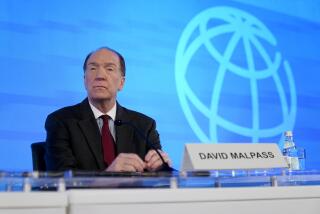Wolfowitz says he won’t be resigning
- Share via
WASHINGTON — A defiant Paul D. Wolfowitz said Sunday that he would not resign as president of the World Bank in the face of controversy over his role in securing a State Department job and large raise for his girlfriend, a former communications official at the bank.
“This is important work and I intend to continue it,” Wolfowitz said when asked if he would step down after the spring meetings of the bank and the International Monetary Fund.
Questions about Wolfowitz’s future dominated the meetings’ concluding news conference, in which the policy-setting committee of the two groups formally endorsed a decision by the bank’s multinational board of directors to look into the controversy.
“We have to ensure that the bank can effectively carry out its mandate and maintain its credibility and reputation as well as the motivation of its staff. The current situation is of great concern to all of us,” the committee said in a four-page communique after the four-day meeting. “We expect the bank to adhere to a high standard of internal governance.”
Wolfowitz, who as deputy Defense secretary was one of the chief architects of the Bush administration’s Iraq war policy, has been under fire over the matter from both World Bank staffers and foreign development officials, some of whom have chafed at his management style and policy agenda since he took over as bank president in 2005.
Already concerned about his Iraq baggage, critics have complained that Wolfowitz makes decisions based on the advice of a small group of former Bush administration officials he brought with him to the bank. In addition, his efforts to crack down on corruption in countries that receive World Bank money have been unpopular.
The controversy over his girlfriend, Shaha Ali Riza, has led to charges of a double standard.
“We feel Mr. Wolfowitz has lost the trust of the staff,” said Alison Cave, chairwoman of the World Bank Group Staff Assn., which represents the organization’s 13,000 employees and consultants. “We do not see how he can regain it, and we feel he must act honorably and resign.”
Wolfowitz apologized Thursday for taking part in decisions regarding Riza’s transfer, which was made to avoid a conflict of interest when he became the bank’s president in 2005. She was assigned to the State Department and her pay was boosted from $132,600 to $180,000. She recently received another raise, to $193,590. Secretary of State Condoleezza Rice earns $186,600.
Wolfowitz said he pointed out the potential conflict of interest when he was hired and asked to be recused from decisions about Riza, but that the bank’s ethics committee told him “to promote and relocate” her. He said Thursday that he wished he had trusted his initial instincts and stayed out of the negotiations over Riza’s pay and new job.
The bank’s board is considering what actions, if any, to take against Wolfowitz. Those discussions were sidetracked by the regularly scheduled spring meetings, which Cave said were overshadowed by the controversy.
“This has damaged our credibility and our ability to help countries work on their own governance if they point to us and say that we don’t even have good governance in the World Bank,” she said.
The White House has publicly said that it stands by Wolfowitz, who was appointed by Bush. By tradition, the United States picks the bank’s president and European nations choose the IMF’s managing director.
On Saturday, Britain’s development minister, Hilary Benn, said the controversy had damaged the World Bank and should not have been allowed to happen. He did not express support for Wolfowitz. But African finance ministers had praise for Wolfowitz, who has championed increased aid to Africa.
On Sunday, Wolfowitz cited the bank’s work in Africa as a reason he intended to stay on the job. Asked whether he could still be effective given the controversy, he said he could.
“Look, I believe in the mission of this organization and I believe that I can carry it out,” he said. “We need to work our way through this. The board is looking into the matter. We’ll let them complete their work.”
Times staff writer Joel Havemann contributed to this report.
More to Read
Inside the business of entertainment
The Wide Shot brings you news, analysis and insights on everything from streaming wars to production — and what it all means for the future.
You may occasionally receive promotional content from the Los Angeles Times.











